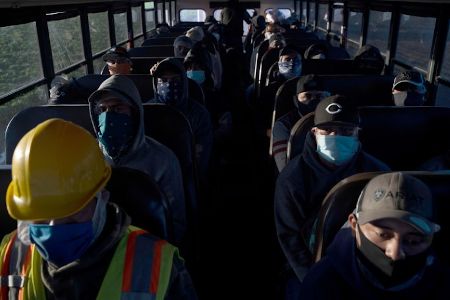By Victoria Knight
It's a busy time for the tomato-producing farms in eastern Tennessee. Farms have staffed up with hundreds of workers, most of whom are Latino. Some live locally. Others are migrant workers who travel from farm to farm, chasing the summer growing seasons. Still others come from Mexico or Central America on temporary agricultural visas to work at certain farms.
But, this year, the season is taking place under a cloud of coronavirus worries that, for these agricultural workers, hit close to home.
"Almost every part of the process for picking tomatoes needs to be considered in light of COVID-19," says Ken Silver, an associate professor of environmental health at East Tennessee State University, who studies migrant worker health on Tennessee tomato farms.
After all, the workers live in close quarters, sleeping in bunk beds, and sharing bathrooms and kitchens. They ride crowded buses to fields and often work in groups. And even though farm employees are deemed essential workers, they often don't have health insurance or paid sick leave.
Farms have already reported outbreaks among hundreds of workers in states that include California, Washington, Florida and Michigan. And yet, the federal government has not established any enforceable rules either to protect farmworkers from the coronavirus or to instruct employers what to do when their workers get sick. While migrant worker advocacy groups say this allows farms to take advantage of their workers and increase their risk of exposure to the coronavirus, farms say they're doing what they can to protect workers with the limited resources they have, while also getting their crops harvested.
The situation certainly isn't clear-cut, says Alexis Guild, director of health policy and programs at the advocacy group, Farmworker Justice.
"I do think some employers are putting in necessary protections," Guild says. But she has heard of workers who, after testing positive for COVID-19, were still required to work or were sent back to their countries — an economic threat that creates a strong incentive for workers not to report mild symptoms. "I think it's hard to generalize. It really varies employer by employer."
Leaving it up to the farms
In June, 10 temporary workers out of about 80 at the Jones & Church Farms in Unicoi County, Tenn., tested positive for the coronavirus. Another farm in that county had 38 workers test positive around the same time.
"This was the scariest thing that could happen," says Renea Jones Rogers, the farm's food safety director.
Nationally, there have been at least 3,600 cases of farmworkers testing positive for COVID-19, according to media reports gathered by the National Center for Farmworker Health.
Add to this that farm employers and workers alike acknowledge that even the most basic interventions to stop transmission — social distancing and mask-wearing — often aren't feasible, especially in the hot temperatures.

Farm laborers arrive for their shift in Greenfield, California, April 28, 2020. Traveling to the fields in crowded buses is one risk among others that workers often face daily.
Saul, 52, is a temporary farmworker who has traveled from Mexico to Virginia every year since 1996 to harvest tobacco. In a WhatsApp message interview, he said masks are uncomfortable on the job because he is working outdoors, writing in Spanish, "En el trabajo es incómodo porque trabajamos al intemperie." (Kaiser Health News is not publishing Saul's last name so that he won't be identified by his employer.)
Saul said he does worry about the coronavirus, but because he lives at his job on the farm, he feels safe.
When he arrived in the U.S. in April, the farm provided him with information about the pandemic, masks and hand sanitizer, he said. Nobody takes his temperature, but he works in a crew of eight, lives with only three other workers and nobody on the farm has yet been diagnosed with COVID-19.
In Tennessee, the Jones & Church Farms put its own worker safety protocols in place at the beginning of the season. These included increasing sanitation, taking daily temperature readings and keeping workers in groups so they live and work with the same people.
After the 10 workers tested positive for COVID-19, the farm kept them all in the same housing unit and away from the other workers — but those who were asymptomatic also kept working in the fields, though they were able to stay away from others on the job, says Jones Rogers.
Click here to see more...